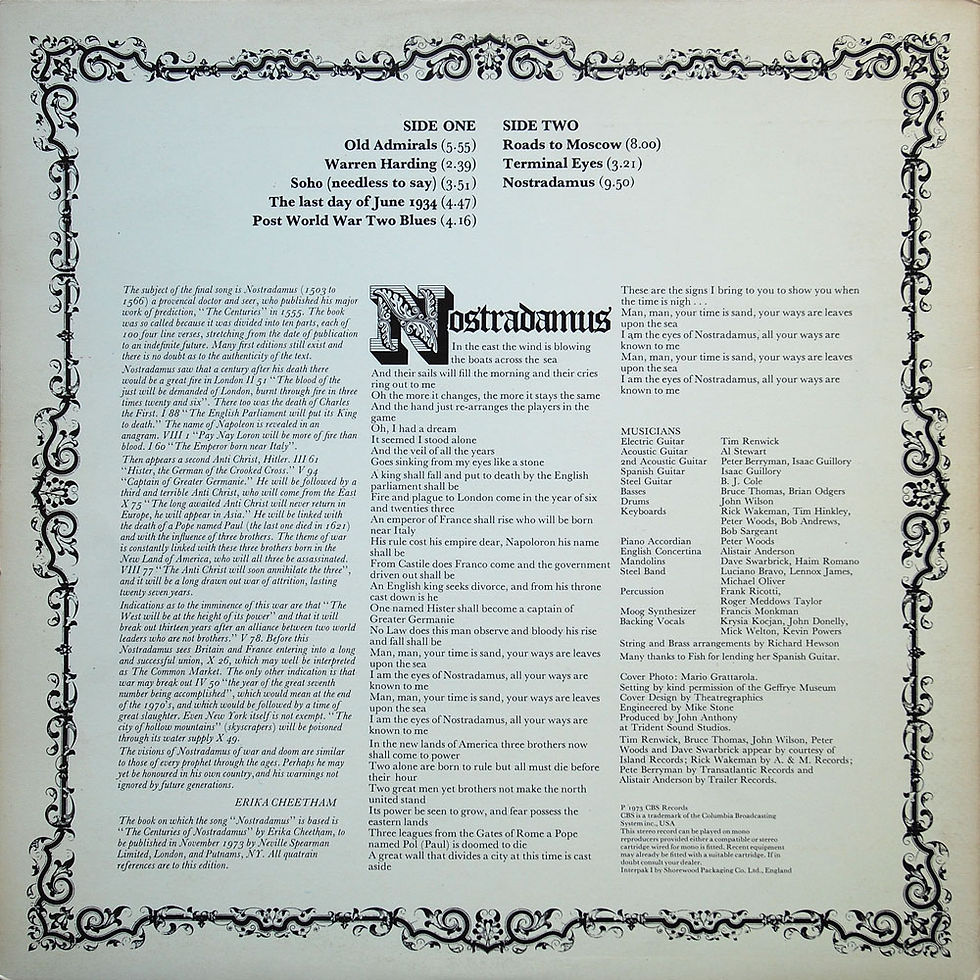AL STEWART: PAST, PRESENT & FUTURE REVISITED
- Jun 18, 2021
- 6 min read

A short staycation in Devon beckons today and so we are taking a break from regular Fifty3 Fridays, the land of new music and most things independent. So, marvel instead as we revisit a record from the glorious days of the concept album. This one will be 48 years old come October and sounds as grand today as when it was first received.
If 'tis songs with a historical bent that ye seek, look no further than Al Stewart’s 1973 vintage construct in time travel, Past, Present & Future. Stewart himself is certainly a much-travelled man. Born a Scot, raised in rural England, a resident of London’s Soho in the late sixties, and a Californian for the past 45 years, the singer-guitarist and songwriter has earned plaudits for his particular brand of folk–rock on both sides of the Atlantic. This album almost serves as a potted history of the twentieth century and the original cover art features an Edwardian-looking Stewart, resplendent in a three-piece suit, posing by a mirrored mantelpiece. The neo-Charles II hairdo is almost, but not quite, incongruous.
Al Stewart was part of the late sixties British folk revival and kept some heady company in his early career, including sharing a London apartment with a youthful Paul Simon and hosting at the legendary Les Cousins folk club. His initial output largely concerned the birds and bees but still had its fair share of experimentation. His second album, Love Chronicles, was infamous for two reasons: the title track recounted serial sexual encounters over a fulsome 18 minutes and was the first ever mainstream recording to include the F-word. It also featured a pre-Zeppelin Jimmy Page on guitar along the way. Stewart went on to develop into an increasingly mainstream folk/soft rock performer by the mid to late ’70s with successive platinum albums, Year of the Cat and Time Passages. His more recent recordings, though, saw a return to the intimate folk style of his earlier work.
Past, Present & Future was Stewart’s fifth album, and being a concept album was very much a child of its time. The original idea was that each song would represent a decade from the 20th century, though the opening song, “Old Admirals”, harks back to the mid-1800s. The album packs several highlights from the epic sweep of “Roads To Moscow” (above) to the less congruous yet very clever slice of Beatles inspired psychedelia, “Terminal Eyes”. That covers the past and present, leaving the future, as viewed from the past, to the final track. The record concludes with a near 10-minute marathon entitled “Nostradamus”, conceived about the 16th century French doctor and conjectured seer of that name. Nostradamus, or more correctly, Michel de Nostredame, published his major work of prediction, Les Propheties, in 1555. The book was divided into 10 parts, each consisting of 100 quatrains (four-line verses).
Nostradamus is credited with foretelling a great many world events and, as a by-product, giving countless academics good reasons to disagree with each other. The balance of opinion seems to be that the connections made between what Nostradamus wrote and subsequent major events in the human calendar start with mistranslation, are often tenuous in the extreme and rely greatly on interpretation by hindsight. That old one! We strongly recommend that no one tells Dan Brown about Nostradamus. Don’t mention the Bible Code in the same sentence either.
Meanwhile back in the early ’70s, Al Stewart was clearly intrigued by Nostradamus sufficiently to delve deeper and commit several of these alleged prophecies to a song. The sleeve notes to Past, Present & Future reveal that Stewart’s particular muse was the British medieval scholar, Erika Cheetham, and her book, The Centuries of Nostradamus. The author decoded people and events from the Frenchman’s writings, including the Great Fire of London, the death of Charles I, the existence of Napoleon, the rise of Hitler, the death of the Kennedys (“three brothers born in the New Land of America”), the fall of the Berlin Wall and the death of a Pope named Paul. Cheetham died in 1998 but otherwise might well have figured Osama bin Laden as the “third and terrible Anti-Christ, who will come from the East”.

So, to the song itself; “Nostradamus” opens with resonant DADGAD-tuned acoustic guitar, gently phased and heralding a voyage, or maybe the great journey of life itself. “In the east the wind is blowing the boats across the sea/And their sails will fill the morning and their cries ring out to me.” Stewart goes on to borrow a famous phrase from the 19th century French writer, Alphonse Karr: “Plus ça change, plus c'est la même chose.” Or in Stewart-speak, “Oh, the more it changes, the more it stays the same/And the hand just re-arranges the players in the game.” The hand might be of God, or of fate. Either way the songwriter switches from narrator to the seer himself with a succinct and spine-tingling bridge: “Oh, I had a dream/It seemed I stood alone/And the veil of all the years/Goes sinking from my eyes like a stone.”
Those lines are bridged by an Incredible String Band-like burst of guitar sounding like sitar and the song starts proper with an ascending acoustic riff underpinned by some neat bass. The prophecies are delivered in regular quatrains to echo the original author, beginning with:
“A king shall fall and put to death by the English parliament shall be
Fire and plague to London come in the year of six and twenties three
An emperor of France shall rise who will be born near Italy
His rule cost his empire dear, Napoloron his name shall be
From Castile does Franco come and the Government driven out shall be
An English king seeks divorce, and from his throne cast down is he
One named Hister shall become a captain of Greater Germanie
No law does this man observe and bloody his rise and fall shall be.”
There is a touch of doggerel about Stewart’s rhymes but the effect of his words is strangely compelling, helped by the driving instrumental break that follows each verse with its stings recalling the heyday of Simon & Garfunkel. Maybe Stewart is borrowing a lick from his erstwhile flatmate, who of course would have called him Al.
It’s time for the all-seeing chorus:
“Man, man, your time is sand, your ways are leaves upon the sea
I am the eyes of Nostradamus, all your ways are known to me
Man, man, your time is sand, your ways are leaves upon the sea
I am the eyes of Nostradamus, all your ways are known to me.”
We then get more than a glimpse of Al Stewart’s guitar mastery via the wonderful indulgence of a mesmeric three-minute long, break your strings, strumming tour-de-force packed with harmonics, fretboard workouts and phasing effects. This segment of the song starts slowly with an Eastern-inspired theme, which glides, swoops and builds to reach a set-piece, extended crescendo before falling back to the opening riff that prefigured the opening prophecies. We then get two final bursts of prediction, delivered in an equally hypnotic manner.
“In the new lands of America three brothers now shall come to power
Two alone are born to rule but all must die before their hour
Two great men yet brothers not make the north united stand
Its power be seen to grow, and fear possess the eastern lands
Three leagues from the gates of Rome a Pope named Pol is doomed to die
A great wall that divides a city at this time is cast aside
These are the signs I bring to you to show you when the time is nigh.”
The song concludes with a last chorus and then resolves by way of the operatic strains of a lone female voice resonating above a single acoustic strum.
I sat cross-legged at a solo college gig in the autumn of ’73 when Al Stewart toured this album and there was no doubt how utterly captivating “Nostradamus” sounded live. It also had the effect of sending post-Hippy English students scurrying to the library to check out the man in the title and gave rise to a locally short-lived yet criminal over-use of the phrase, “Far out, man.” Yes, we were taken in as much as Stewart had been.
Perhaps we should close with what Al Stewart wrote about this visionary in his own sleeve notes. “Whether or not you believe his prophecies to be true rests with you, but history seem to be on his side.” Sceptics might say you can make the obscure and nebulous mean practically anything but I doubt if many could play the guitar quite so well as the man with history on his side too.
Al Stewart is back on tour in the UK with his band The Empty Pockets this autumn. Tickets details are HERE.
A version of this article first appeared on www.consequence.net in 2010




